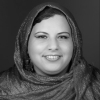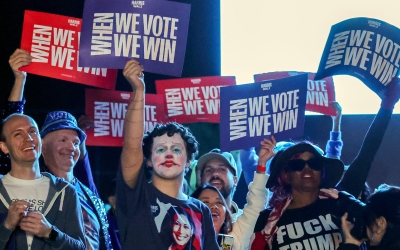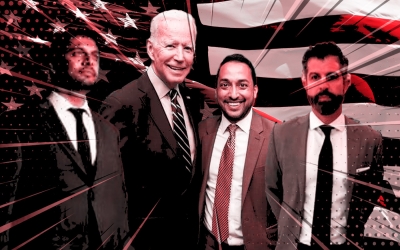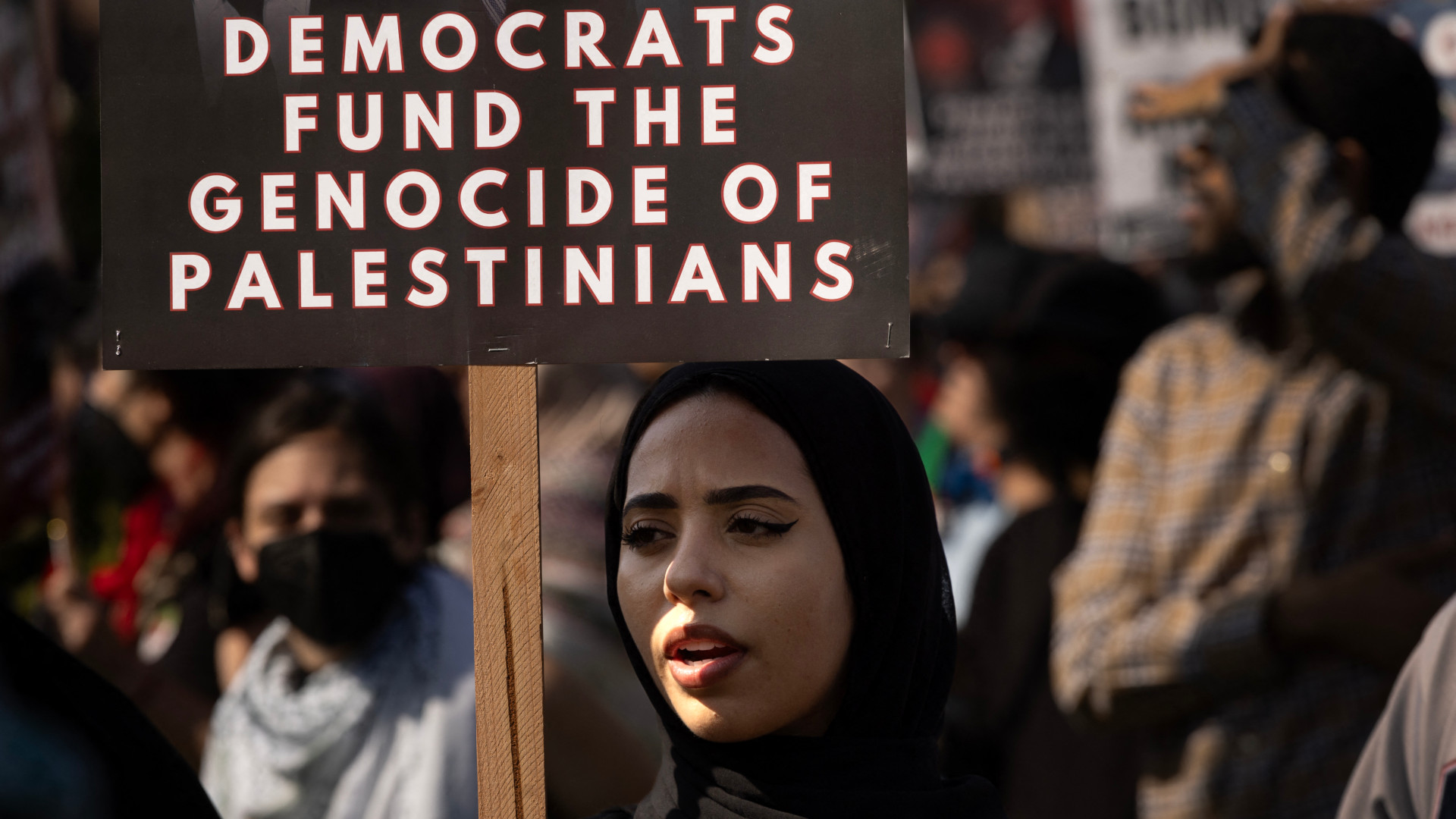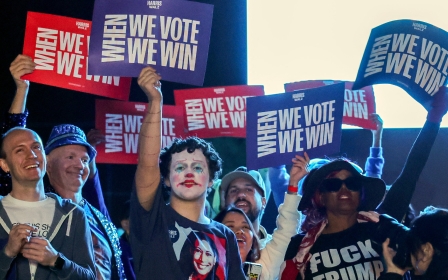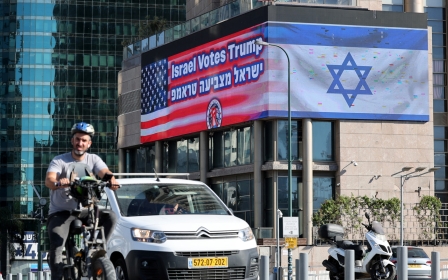How Muslim American elites weaponised identity to push for Kamala Harris

Over the last year, Israel's genocidal war on Gaza has cast an even darker shadow over the 2024 US presidential election, in which the majority of Americans have expressed dissatisfaction over the main candidates running.
Voter frustration with the two-party system has only been exacerbated by the broad bipartisan support for Israel's mass slaughter of Palestinians.
For some, glimmers of hope began to emerge with the rise of Arab and Muslim-led movements to "abandon" President Joe Biden and, later, Vice President Kamala Harris - or remain "uncommitted" to endorsing any Democratic incumbents until they force a ceasefire in Gaza.
It wasn't long, however, before hope and the seeming commitment to political change gave way to cynicism and political opportunism.
Uncommitted movement leaders' pledges to hold politicians accountable over Gaza through votes were replaced with milquetoast demands centred on Palestinian representation. And even when those half-hearted calls were denied, the narrative began to mirror the standard Democratic Party line on the unique danger that Donald Trump poses.
New MEE newsletter: Jerusalem Dispatch
Sign up to get the latest insights and analysis on Israel-Palestine, alongside Turkey Unpacked and other MEE newsletters
At the Democratic National Convention in August, delegates physically and verbally attacked pro-Palestine protesters while party leaders who invited an Israeli family to the primetime stage denied Palestinian and Muslim community members the same platform.
Yet even after this humiliating spectacle, several Muslim organisations and faith leaders declared their support for the Harris campaign without any prior concessions or promises to change course on any Biden administration policies.
The newly formed "Muslims for Harris" and "Muslim Women for Harris", along with Emgage, whose ties to pro-Israel groups are well documented, quickly waged campaigns targeting Muslim voters.
Several Muslim organisations and faith leaders declared their support for the Harris campaign without any prior concessions
Much of it was built on gaslighting assertions that Harris would work towards a ceasefire in Gaza and regurgitated 2020 claims - what should now be considered thoroughly debunked - of a Democratic White House meaningfully engaging Muslim constituents.
Many of the usual suspects, Democratic Muslim politicians and self-described community leaders, long known for their participation in Zionist normalisation and faithwashing projects, resurfaced, emboldened by this opportunistic political turn - even as potentially hundreds of thousands of Palestinians remain buried under the rubble.
By long ingratiating themselves to the political and media establishment, this group of Muslim elites were able to widely promote their brand of political activism, which feigns a vague humanitarian concern for Gaza while, in fact, privileging an American-exceptionalist Muslim identity whose biggest threat is Trump's particular strain of Islamophobia.
Indeed, what began as a critical opportunity - against a profound tragedy - for Palestinian, Arab and Muslim communities to build and wield political power to demand change was quickly co-opted in what American thinker Olufemi Taiwo aptly describes as "elite capture".
As millions of Americans head to the ballot box today, Taiwo's concept is instructive to understand how "well positioned and resourced" Muslim leaders have been able to weaponise identity politics and hijack efforts to mobilise against the US "unconditional" backing of Israel.
Enter elite capture
On Israel's genocidal wars, Harris has done little to nothing to distinguish herself from Biden on the logic and mechanics of US support.
She has been in lockstep with the Democratic Party's ironclad approach to Israel.
This commitment to always supporting "Israel's right to defend itself" has underpinned her public messaging, from throwaway comments on CNN to scripted campaign ads on television.
Given Harris's apparent disregard for Palestinian lives and unwillingness to demand a ceasefire, many of her supporters have understandably struggled to formulate a coherent response to the 42 percent of Arab and Muslim voters leaning towards a third-party vote.
Still, on 1 November, the Uncommitted National Movement released a short video four days before election day urging people to "vote against Trump".
Abbas Alawieh, the Lebanese co-founder of the group, draped himself in a keffiyeh and tried to implicitly convince Arab and Muslim Americans the Democratic Party was still the natural home of Arab and Muslim Americans.
In the absence of a policy shift, Uncommitted appeared to adopt Democratic Party strategies of relying on cultural and political symbols to create the affect of familiarity and trust with a disgruntled constituency.
But this trust has been breached on several occasions - not just by Uncommitted but by others vociferously advocating for Harris as well.
A recent MEE investigation, for example, revealed that some organisers lobbying for Harris blamed the use of the word "genocide" by pro-Palestine groups - and not the genocide itself - as a stumbling block to ending the war.
Other Muslim supporters have shed the pretence that Harris will make any difference on Gaza, citing her alleged contributions to the Black community - a record that has long been discredited.
Harris's dismal record and brazen refusal to appease Arab and Muslim voters has prompted a flurry of articles on the hard choice they face on election day. Even James Zogby, co-founder of the Arab American Institute and executive committee member of the DNC, pointed the finger at the Democratic presidential nominee: "What I've been saying to the [Harris] campaign since the beginning: Don't blame us, blame yourself," he told Politico.
Zogby had previously identified this moment as a "tipping point" where Washington must finally shift its policy on Palestine.
Yet for Muslim supporters of Harris, the stakes of stopping a live-streamed genocide are diminished against praise of her hosting the first-ever Eid al-Adha celebration at the VP residence.
"Elite capture" explains this apparent contradiction insofar as these groups invoke identity politics to serve their interests while directly standing in the way of any transformative change - especially that which would compromise their proximity to power.
In his book, Elite Capture: How the Powerful Took Over Identity Politics (And Everything Else), Taiwo explains elite capture as a concept built on identity politics that allows privileged members of a group to prioritise their views or interests over genuine advocacy for the communities.
The wider community suffers as a result, particularly those most marginalised within it, since elites function to preserve the status quo while reproducing the same systems of oppression and injustice wielded against them.
According to Taiwo, "Elite capture accounts for many of the common objections levelled against identity politics: that it requires uncritical support for political figures without regard to their politics, or that it reflects social preoccupations that are 'really for rich white people'."
As for who constitutes the "elite", Taiwo explains that this status could be achieved through different avenues, including education, wealth, or social prestige. It could also be gained through one's identity, especially if that individual is the only person in the room.
Taiwo cites political scientist Jo Freeman, whose definition of the elite is highly relevant to Muslim American politics: "An elite refers to a small group of people who have power over a larger group of which they are part, usually without direct responsibility to that larger group, and often without their knowledge or consent."
Weaponising identity
Unlike the native informant - a concept developed by literary theorist Gayatri Spivak that gained wider understanding after 9/11 to explain the role that some members of marginalised groups play in entrenching demonising tropes to bolster the dominant group - elite members push their own interests as representative of those in the larger group they claim to represent.
While the consequences of native informants lie more in justifying, for example, violent state policies, elite capture results in destructive internal dynamics, including obstructing any effective advocacy by the larger marginalised community.
Follow Middle East Eye's live coverage of the Israel-Palestine war
By serving and demonstrating loyalty to the political establishment, both types converge in perpetuating the notion of the "Good Muslim".
Keeanga-Yamahtta Taylor, a scholar of African-American studies, applies Taiwo's concept to the inclusion of Black communities in policymaking decisions on issues that directly impacted them, particularly after the struggles of the 1960s and '70s.
Despite having a proverbial "seat at the table", she notes that this "shallow representation of African Americans in politics" had little bearing on creating more equitable conditions for these groups. "The new representatives were not interested in transforming the system so much as they were trying to navigate it," she observes.
Taiwo's analysis of elite capture is meant to be prescriptive. Thus, he also offers solutions to address the problems of deploying identity markers or promoting symbolic representation.
This includes what he refers to as "constructive politics", which requires a redistribution of social resources and power rather than "pursuing intermediary goals cashed out in symbols".
Ultimately, Taiwo stresses the importance of pushing for systemic and structural change, which he acknowledges is difficult, though necessary, to achieve any meaningful change, especially insofar as elite capture has served to stifle these efforts.
Muzzling Muslims
The current political moment has served to painfully illustrate this troubling yet familiar dynamic in the lead-up to today's election.
As in the 2020 presidential election, Muslim elites are aggressively campaigning for candidates seemingly on the basis of who is more likely to reward their loyalty rather than who will best protect the rights of the community at large.
When Emgage endorsed then-presidential candidate Biden, CEO Wa'el Alzayat celebrated the former vice president's alleged support for the Muslim American community whose voices he envisioned would be "represented through his presidency".
Yet this vision was not even realised through his presidential campaign.
Biden had "firmly rejected" the Boycott, Divestment, and Sanctions movement and claimed that leftist pro-Palestine activism "morphs into antisemitism".
That Biden was touted as "the most pro-Israel nominee ever" from any party did not dissuade several Muslim groups, chiefly Emgage, from freely offering their endorsement.
Unsurprisingly, Biden's blatant disregard for Arabs and Muslims continued even after a majority of voters from those communities helped carry him to victory.
Moreover, despite his stated opposition to and eventual repeal of the Muslim Ban, Biden signed an executive order this past June that relied on a regulation from the ban to restrict asylum seekers coming in through the US-Mexico border.
Still, this experience was not enough to discourage Emgage from placing their bets on his vice president and partner in [war] crime.
Nor was the fact that Biden and several members of his administration helped spread false allegations - from the president himself claiming to have seen non-existent photos of beheaded Israeli babies to Harris perpetuating the debunked Hamas "mass rape" story and Secretary of State Antony Blinken knowingly lying to Congress on Israel as it continues to block humanitarian aid trucks to Gaza, let alone the many lies about the ceasefire negotiations - in order to sell a genocide.
In its confused endorsement of Harris, Emgage professes "outrage" over the "crisis in the Middle East", conveniently placing the blame squarely on the president. Despite its calls for "new leadership", it then goes on to declare its support for Harris, a candidate who embodies the status quo.
How exactly Harris represents this "new leadership" or a promise of "changing course" remains a mystery.
But have no fear: Emgage has promised to "ensure that the next administration listens to our communities" and takes our demands "seriously" - a pledge the group made in 2020 that has clearly panned out for a community willing to forfeit any leverage it has actually to hold leaders accountable.
Yet such behaviour is typical of Emgage, long exposed for its role in muting Muslim voices in exchange for political access - in other words, elite capture.
Political alienation
While many Muslim elites have tried desperately to curry favour with the Democratic Party establishment, Democrats have not hesitated to continually reject Muslim support and participation.
Earlier this year, two Muslim women were denied entry into a Democratic campaign event in Nevada to which they were invited. In Michigan, where Harris is tied with Green Party candidate Jill Stein, a Muslim community leader was kicked out of a Harris campaign event just two weeks before the election.
What this political moment has demonstrated so clearly is that the Muslim American community was undercut by the elite
Even Uncommitted's Alawieh expressed his astonishment that the Harris campaign told the movement "in no uncertain terms that they do not want [their] endorsement".
While the Harris campaign has refused to engage Muslim voters or respond to any of their concerns, Trump, meanwhile, has made an aggressive push for their votes, becoming the first 2024 presidential candidate to meet with Arab Americans in Dearborn, Michigan.
Of course, there is nothing genuine about Trump's attempt to secure Muslim and Arab American votes. Still, the Democrats and Harris, who bill themselves as an inclusive party, have so thoroughly discarded these communities that the unfortunate and misguided response of some has been to gravitate towards Trump - with Trump being more than happy to enter and exploit this growing chasm.
What this political moment has demonstrated so clearly is that the Muslim American community, which for once had leverage to demand change and accountability, was undercut by the elite among them who wielded identity politics and cosplayed "resistance" to usurp power.
Lest the efforts of these groups be wrongly construed as evidence of the political power of Muslims, it is critical to underscore what this term means.
According to one definition: "Political power is the ability of one political actor - eg, an individual citizen, a family, an interest group, a political action committee, a political party, or the government - to effect a desired change in the behaviour of other political actors, persuading or forcing the latter to act in a manner they would not act in the absence of the former's impact on the situation."
Sadly, the last two elections have only proved how little power Muslim Americans have - and any modicum of power that they did have - was discarded by the elites who prioritise themselves over any meaningful and desperately needed change.
Not all hope is lost, however. Many Muslim Americans who refuse to align with these groups have rejected these humiliating negotiations of their humanity and the politics that the elite in the community have tried to impose on them.
For these Muslim Americans, challenging US empire and state violence while demanding total accountability remains imperative, regardless of which candidate and party assumes the presidency.
Perhaps it's because they have heeded the words of Amilcar Cabral, a Bissau-Guinean and Cape Verdean pan-Africanist intellectual and political organiser who made it clear that the fight against oppression is both external and internal when he said: "We are struggling to liberate our people not only from colonialism but also from any form of exploitation. We want no one to exploit our people any more, neither whites nor blacks."
After over a year of the US-backed Israeli genocide of Palestinians, we must demand a new and radical path forward that is not fundamentally entrenched in violence and systems built on the death and destruction of our communities.
This can only happen if Muslims develop a politic that transcends a two-party system and is rooted in justice and dignity. A better future for Muslims is possible, but only if we believe it is and refuse to accept anything less than our categorical rights.
The views expressed in this article belong to the author and do not necessarily reflect the editorial policy of Middle East Eye.
Middle East Eye delivers independent and unrivalled coverage and analysis of the Middle East, North Africa and beyond. To learn more about republishing this content and the associated fees, please fill out this form. More about MEE can be found here.


